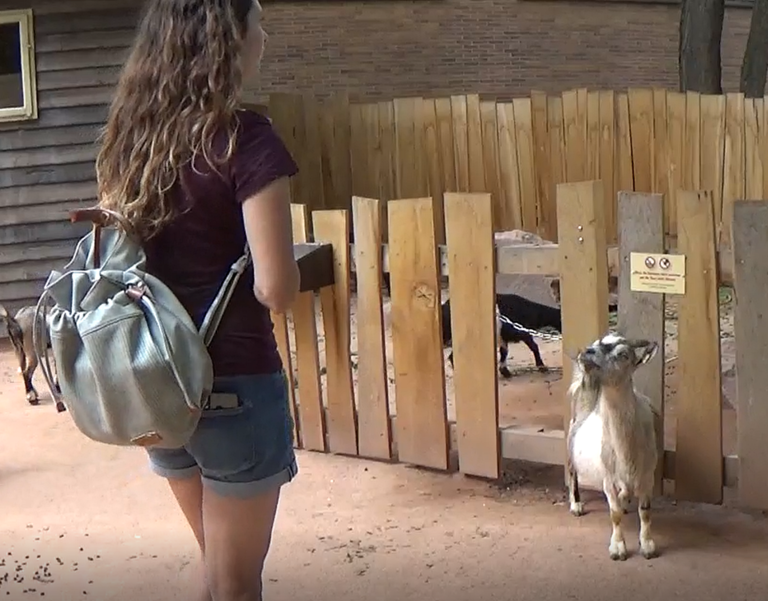Dr. Alina Schaffer

Position: Associated guest scientist
E-mail: alina.schaffer@[>>> Please remove the text! <<<]uni-leipzig.de
Research Group Primate Behavioural Ecology
Max Planck Institute for Evolutionary Anthropology
Department of Primate Behavior and Evolution
Deutscher Platz 6
D-04103 Leipzig
Germany
and
University of Leipzig Faculty of Life Science
Institute of Biology
Behavioral Ecology Research Group
Talstrasse 33
D-04103 Leipzig
Germany
Research interests
In the last century, a large number of studies have experimentally investigated cognitive skills across animals, providing us with a vast dataset on the distribution of specific cognitive skills across taxa. By comparing cognitive skills across species, researchers may evidence variation in problem-solving abilities and better understand the proximate processes leading to the emergence of complex cognition. Moreover, a comparative approach allows researchers to understand the evolutionary challenges linked to the emergence of specific skills, shedding light into the evolutionary origins of human cognition. This approach uniquely allows addressing questions about the uniqueness of human cognition and its evolutionary endowment, and it is therefore crucial for researchers spanning from comparative and developmental psychology to evolutionary biology and psychology.
In my project, I will work on ungulates, which are an ideal model to test, as they show an impressive variety of socio-ecological characteristics like dietary breadth, predation level, group size, fission-fusion sociality or domestication level. By testing different species, I will assess which socio-ecological characteristics are linked to enhanced performance in different cognitive tasks, while controlling for intra-specific variation (in terms of sex, age, rank, sociality, personality). By directly comparing their performance with the same battery of ecologically valid cognitive tasks, I will be able to understand which evolutionary forces likely led to the emergence of these skills.
Curriculum vitae
Education
| 09/2024-today | Post-doctoral researcher University of Leipzig Topic: Human-Animal Interactions: Which socioecological factors predict inter- and intra-specific variation in the ability of ungulates to understand humangestures? |
| 10/2020-09/2024 | PhD student |
| 03/2019-04/2020 | Graduate assistant (Pre-Doc-Award) University of Leipzig Activities: teaching, research |
| 10/2015-02/2018 | Master of Science in Molecular Ecology University of Bayreuth Thesis title: „Predator-induced morphological defenses in male Daphnia“ |
| 10/2011-01/2016 | Bachelor of Science in Biology University of Bayreuth Thesis title: “Is the archerfish predictive start fed with information from all spectral channels?” |
Work experience
| 03/2019-03/2020 | Research assistant (as Pre-doc award) Project “Gaze following in ungulates: domesticated and non-domesticated species follow the gaze of both humans and conspecifics in an experimental context” under the supervision of Dr. Federica Amici (MPI EVA, University of Leipzig) |
| 04/2018-08/2018 | Research assistant Project “Innovation and social facilitation tests in ungulates” under the supervision of Dr. Federica Amici (MPI EVA, University of Leipzig) |
| 10/2017-01/2018 | Research assistant Project “Neophobia in ungulates – a comparative approach“ under the supervision of Dr. Federica Amici (MPI EVA, University of Leipzig) |
| 11/2015 + 02/2016 | Student assistant University of Bayreuth, Department of plant ecology |
Grants awarded
| 10/2020-today | PhD funding by the Cusanuswerk e.V |
| 03/2019-03/2020 | Pre-Doc Award (Funding for preparing a PhD project) by the Research Academy of the University of Leipzig |
Publications
Schaffer, A., Caicoya, A. L., Widdig, A., Holland, R., & Amici, F. (2025). Quantity discrimination in 9 ungulate species: Individuals take item number and size into account to discriminate quantities. Cognition, 254: 105979. |
Schaffer, A. (2024). From antelopes to zebras: which factors explain inter- and intraspecific variation in ungulate cognition? PhD Thesis. |
|
Schaffer, A., Widdig, A., Holland, R., & Amici, F. (2024). Evidence of object permanence, short-term spatial memory, causality, understanding of object properties and gravity across five different ungulate species. Scientific Reports, 14(1): 13718. |
|
Berardo, C., Holland, R., Schaffer, A., Lopez Caicoya, A., Liebal, K., Valsecchi, P., & Amici, F. (2024). Perception of optical illusions in ungulates: Insights from goats, sheep, guanacos and llamas. Animal Cognition, 27: 40. |
Caicoya, A. L., Schaffer, A., Holland, R., Fersen, L. v., Colell, M., & Amici, F. (2023). Innovation across 13 ungulate species: problem solvers are less integrated in the social group and less neophobic. Proceedings of the Royal Society B: Biological Sciences, 290(1996): 20222384. |
Schaffer, A., Caicoya, A. L., Colell, M., Holland, R., von Fersen, L., Widdig, A., & Amici, F. (2021). Neophobia in 10 ungulate specie - a comparative approach. Behavioral Ecology and Sociobiology, 75: 102. |
Schaffer, A., Caicoya, A. L., Colell, M., Holland, R., Ensenyat, C., & Amici, F. (2020). Gaze following in ungulates: Domesticated and non-domesticated species follow the gaze of both human and conspecifics in an experimental context. Frontiers in Psychology, 11: 604904. |
Alina Schaffer, Alvaro L. Caicoya, Montserrat Colell, Ruben Holland, Lorenzo von Fersen, Anja Widdig, Federica Amici. “Neophobia in ungulates – a comparative approach”.
 Open Access
Open Access